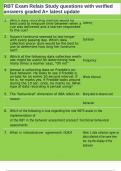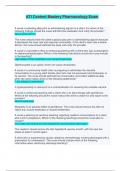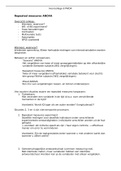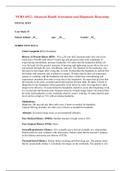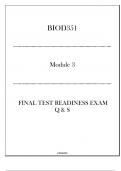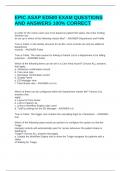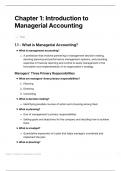,AFL2601 Assignment 2 (COMPLETE ANSWERS) Semester 2
2024 - DUE 2024 ; 100% TRUSTED Complete, trusted solutions
and explanations.
QUESTION 1: SOCIO-HISTORICAL INTRODUCTION TO AFRICAN
LANGUAGES 1.1 List the nine official indigenous South African Languages,
and critically discuss why these languages can be classified as a ‘language
family’ on their own. (13) 1.2 Does Afrikaans form part of indigenous South
African languages? Give reasons for your answer. (2) 1.3 Demonstrate
language zone in your province of residence, and how the standard language
has been chosen or selected. (5) /20/
QUESTION 1: SOCIO-HISTORICAL INTRODUCTION TO
AFRICAN LANGUAGES
1.1 List the Nine Official Indigenous South African Languages and
Discuss Why They Can Be Classified as a ‘Language Family’
The Nine Official Indigenous South African Languages:
1. IsiZulu
2. IsiXhosa
3. Sesotho
4. Setswana
5. Sepedi
6. Siswati
7. Tshivenda
8. Xitsonga
9. Xitsonga (Note: English is also an official language but is not
indigenous.)
Classification as a 'Language Family':
These languages can be classified as a ‘language family’ due to the
following reasons:
, 1. Common Ancestry: These languages belong to the Bantu
language family, a large group of languages spoken in sub-Saharan
Africa. They all trace their origins to a common ancestral
language, known as Proto-Bantu, which was spoken over 2,000
years ago.
2. Structural Similarities: They share significant similarities in
linguistic structure, including common noun class systems, verb
conjugations, and grammatical rules. For instance, many of these
languages use a system of noun classes that influence the
agreement of verbs, adjectives, and other parts of speech.
3. Lexical Similarities: There is considerable overlap in vocabulary
among these languages. Many words have similar roots, making it
possible for speakers of one Bantu language to recognize and
understand words from another, even if they are not fluent in that
language.
4. Cultural and Historical Connections: These languages are
spoken by communities that have historically been interconnected
through trade, migration, and shared cultural practices. This
historical interaction has contributed to their linguistic similarities.
5. Mutual Intelligibility: Some of these languages are mutually
intelligible to varying degrees, meaning speakers of one language
can understand another language within the family without
extensive learning. For example, Sesotho and Setswana are closely
related and share many similarities.
Conclusion: The classification of these languages into a single language
family is based on their shared linguistic features, historical connections,
and cultural interactions, which reflect a common heritage and linguistic
evolution.
1.2 Does Afrikaans Form Part of Indigenous South African
Languages?
No, Afrikaans does not form part of the indigenous South African
languages.
2024 - DUE 2024 ; 100% TRUSTED Complete, trusted solutions
and explanations.
QUESTION 1: SOCIO-HISTORICAL INTRODUCTION TO AFRICAN
LANGUAGES 1.1 List the nine official indigenous South African Languages,
and critically discuss why these languages can be classified as a ‘language
family’ on their own. (13) 1.2 Does Afrikaans form part of indigenous South
African languages? Give reasons for your answer. (2) 1.3 Demonstrate
language zone in your province of residence, and how the standard language
has been chosen or selected. (5) /20/
QUESTION 1: SOCIO-HISTORICAL INTRODUCTION TO
AFRICAN LANGUAGES
1.1 List the Nine Official Indigenous South African Languages and
Discuss Why They Can Be Classified as a ‘Language Family’
The Nine Official Indigenous South African Languages:
1. IsiZulu
2. IsiXhosa
3. Sesotho
4. Setswana
5. Sepedi
6. Siswati
7. Tshivenda
8. Xitsonga
9. Xitsonga (Note: English is also an official language but is not
indigenous.)
Classification as a 'Language Family':
These languages can be classified as a ‘language family’ due to the
following reasons:
, 1. Common Ancestry: These languages belong to the Bantu
language family, a large group of languages spoken in sub-Saharan
Africa. They all trace their origins to a common ancestral
language, known as Proto-Bantu, which was spoken over 2,000
years ago.
2. Structural Similarities: They share significant similarities in
linguistic structure, including common noun class systems, verb
conjugations, and grammatical rules. For instance, many of these
languages use a system of noun classes that influence the
agreement of verbs, adjectives, and other parts of speech.
3. Lexical Similarities: There is considerable overlap in vocabulary
among these languages. Many words have similar roots, making it
possible for speakers of one Bantu language to recognize and
understand words from another, even if they are not fluent in that
language.
4. Cultural and Historical Connections: These languages are
spoken by communities that have historically been interconnected
through trade, migration, and shared cultural practices. This
historical interaction has contributed to their linguistic similarities.
5. Mutual Intelligibility: Some of these languages are mutually
intelligible to varying degrees, meaning speakers of one language
can understand another language within the family without
extensive learning. For example, Sesotho and Setswana are closely
related and share many similarities.
Conclusion: The classification of these languages into a single language
family is based on their shared linguistic features, historical connections,
and cultural interactions, which reflect a common heritage and linguistic
evolution.
1.2 Does Afrikaans Form Part of Indigenous South African
Languages?
No, Afrikaans does not form part of the indigenous South African
languages.

